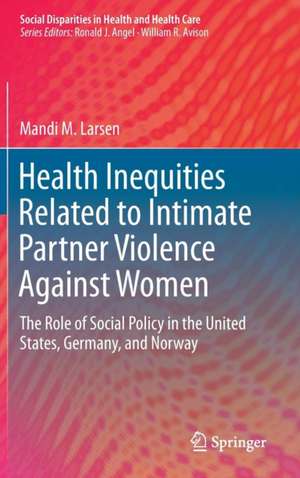Health Inequities Related to Intimate Partner Violence Against Women: The Role of Social Policy in the United States, Germany, and Norway: Social Disparities in Health and Health Care
Autor Mandi M. Larsenen Limba Engleză Hardback – 2 mar 2016
| Toate formatele și edițiile | Preț | Express |
|---|---|---|
| Paperback (1) | 385.47 lei 6-8 săpt. | |
| Springer International Publishing – 7 apr 2018 | 385.47 lei 6-8 săpt. | |
| Hardback (1) | 392.75 lei 6-8 săpt. | |
| Springer International Publishing – 2 mar 2016 | 392.75 lei 6-8 săpt. |
Preț: 392.75 lei
Nou
Puncte Express: 589
Preț estimativ în valută:
75.15€ • 78.47$ • 62.06£
75.15€ • 78.47$ • 62.06£
Carte tipărită la comandă
Livrare economică 15-29 aprilie
Preluare comenzi: 021 569.72.76
Specificații
ISBN-13: 9783319295633
ISBN-10: 3319295632
Pagini: 236
Ilustrații: XII, 236 p. 18 illus., 14 illus. in color.
Dimensiuni: 155 x 235 x 16 mm
Greutate: 0.53 kg
Ediția:1st ed. 2016
Editura: Springer International Publishing
Colecția Springer
Seria Social Disparities in Health and Health Care
Locul publicării:Cham, Switzerland
ISBN-10: 3319295632
Pagini: 236
Ilustrații: XII, 236 p. 18 illus., 14 illus. in color.
Dimensiuni: 155 x 235 x 16 mm
Greutate: 0.53 kg
Ediția:1st ed. 2016
Editura: Springer International Publishing
Colecția Springer
Seria Social Disparities in Health and Health Care
Locul publicării:Cham, Switzerland
Cuprins
Chapter 1. Introduction.- Chapter 2. Intimate Partner Violence: A Theoretical and Empirical Review.- Chapter 3. IPV from a Welfare State Perspective: A Theoretical and Empirical Review.- Chapter 4. The Policy Context in the US, Germany, and Norway.- Chapter 5. Research Design and Methods.- Chapter 6. Findings from Descriptive and Bivariate Analyses.- Chapter 7. Findings on Differential Exposure to IPV.- Chapter 8. Findings on Differential Vulnerability to Poor Health.- Chapter 9. Comparing Policy Contexts: IPV Exposure and Health.- Chapter 10. Conclusion.
Notă biografică
For over a decade, Mandi Larsen has been working in the field of public health, with special emphases on the intersections between health, intimate partner violence (IPV), and social policy. After several years managing research and evaluation projects for a large victim services agency in New York City, she came to Germany in 2008 as a German Chancellor Fellow to examine the effects of comprehensive welfare states on the health of IPV survivors. In addition to Germany, Mandi has also lived and worked in Uganda, Sierra Leone, and Norway. Her undergraduate degrees in psychology and sociology are from Seattle Pacific University, her Master of Public Health degree is from Columbia University, and her PhD in sociology is from the University of Bremen in Germany.
Textul de pe ultima copertă
This book examines the extent to which social position impacts exposure to intimate partner violence (IPV) and whether women with IPV exposure are more vulnerable to social inequities in health. At the intersection of sociological theories on health, gender, and policy, this book explores these issues against the social policy contexts of the United States, Germany, and Norway. It applies a conceptual framework which argues that differential exposure to IPV and differential vulnerability to poor health are two primary mechanisms driving health inequities for IPV survivors. Empirical analysis reveals context-specific nuances in the interactions of social position and IPV exposure in their impact on health, and suggests that encouraging women’s economic independence and ensuring access to health care are vital policy intervention points for reducing the health inequities of IPV survivors. This book offers a cross-national comparative look at the role of social policy in the lives of IPVsurvivors, highlighting the effects of various policy approaches in three modern welfare states and suggesting policy implications.
Caracteristici
Examines the link between health inequities among intimate partner violence (IPV) survivors to the welfare state Directly investigates the intersections between social position, IPV, and health Offers a rare look at the interconnections between the micro- and macro-level factors affecting health inequities for IPV survivors Includes supplementary material: sn.pub/extras




















